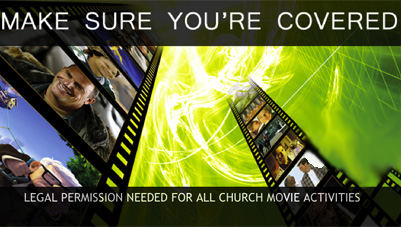CVLI Video Licensing – Showing Videos At Church… Get Legal?
Are your church services full of multi-media? Do you sometimes show movie clips to enhance and better explain the sermon? A licensing organization called CCLI offers the CVLI License which allows you to legally show movies during your services, sermons, classrooms, childcare, church movie nights and more!
I interviewed Marketing Manager Paul Herman of CCLI. Here are his insights for you to better understand the license and applicable laws.
“Back in 1988, CCLI established the music license for churches. Over the years we received many requests from churches to also provide a video license, so they can legally show movies and movie clips. At the time more and more pastors were getting into the trend of using movie clips as sermon illustrations. Additionally, churches were hosting special event movie nights, either for the church at large, or for the various ministries within the church. A church nursery may often put on a VeggieTales video. There are many uses for movies within a typical church.
“But there are copyright issues involved. Most movies that you can buy or rent are intended for personal viewing only. In other words, the licensing which comes with your DVD, Blu-Ray, Stream, Download, etc. only covers viewing the video in your home. Any public performance requires a different type of permission. That’s why we created the Church Video License. We partnered with the Motion Picture Licensing Corporation in Los Angeles. They have agreements with most of the major film studios and a number of Christian producers and studios.”
CCLI additionally offers a service called ScreenVue. ScreenVue provides a library of clips pre-approved for immediate usage in your service, along with thousands of clip ideas for the movies you rent or buy.
“ScreenVue is to CVLI as SongSelect is to CCLI; it is the service arm of CVLI. ScreenVue is designed to offer movie clips and clip ideas to pastors looking for sermon illustrations.”
Over 60,000 churches, camps, Christian schools and childcare centers across North America rely on CVLI and the Church Video License. Globally, CVLI covers over 100,000 members.
What the CVLI License Covers
- Pastors can use selected movies to illustrate sermon points.
- Sunday schools and Youth Groups can view the latest videos.
- Educational classes can use videos for teaching and training.
- Churches can host special event movie nights.
What the CVLI License Does Not Cover
This license does not cover materials that have been illegally obtained. It also does not cover charging an admission fee for video showings or where specific titles have been advertised or publicized to the general public.
The Church Video License also includes a FREE ScreenVue Standard membership.



Does a CVLI cover YouTube video use in sermons and other religious education settings?
Thank you
GR
This paragraph in the CVLI terms seems to suggest that it does cover YouTube, assuming the clip posted to YouTube is a legitimate source and not illegally pirated (though one would think YouTube would take any video down that was pirated):
I think the most important thing is to follow the steps outlined here, and then assuming that film is on their approved list of movies, you should be able to take your clip from YouTube or a DVD you’ve purchased. YouTube is such a common vehicle for watching movie clips that surely CVLI would include them under their definition of a “legitimate source.”
I’m not a lawyer though and this is not official legal advice. You can always click the link above (the “steps outlined” link) and use the number there to give CVLI a call to triple-check.
I’d like to add that YouTube’s terms of service states:
“You agree not to access Content for any reason other than your personal, non-commercial use solely as intended through and permitted by the normal functionality of the Service, and solely for Streaming. “Streaming” means a contemporaneous digital transmission of the material by YouTube via the Internet to a user operated Internet enabled device in such a manner that the data is intended for real-time viewing and not intended to be downloaded (either permanently or temporarily), copied, stored, or redistributed by the user.
You shall not copy, reproduce, distribute, transmit, broadcast, display, sell, license, or otherwise exploit any Content for any other purposes without the prior written consent of YouTube or the respective licensors of the Content.”